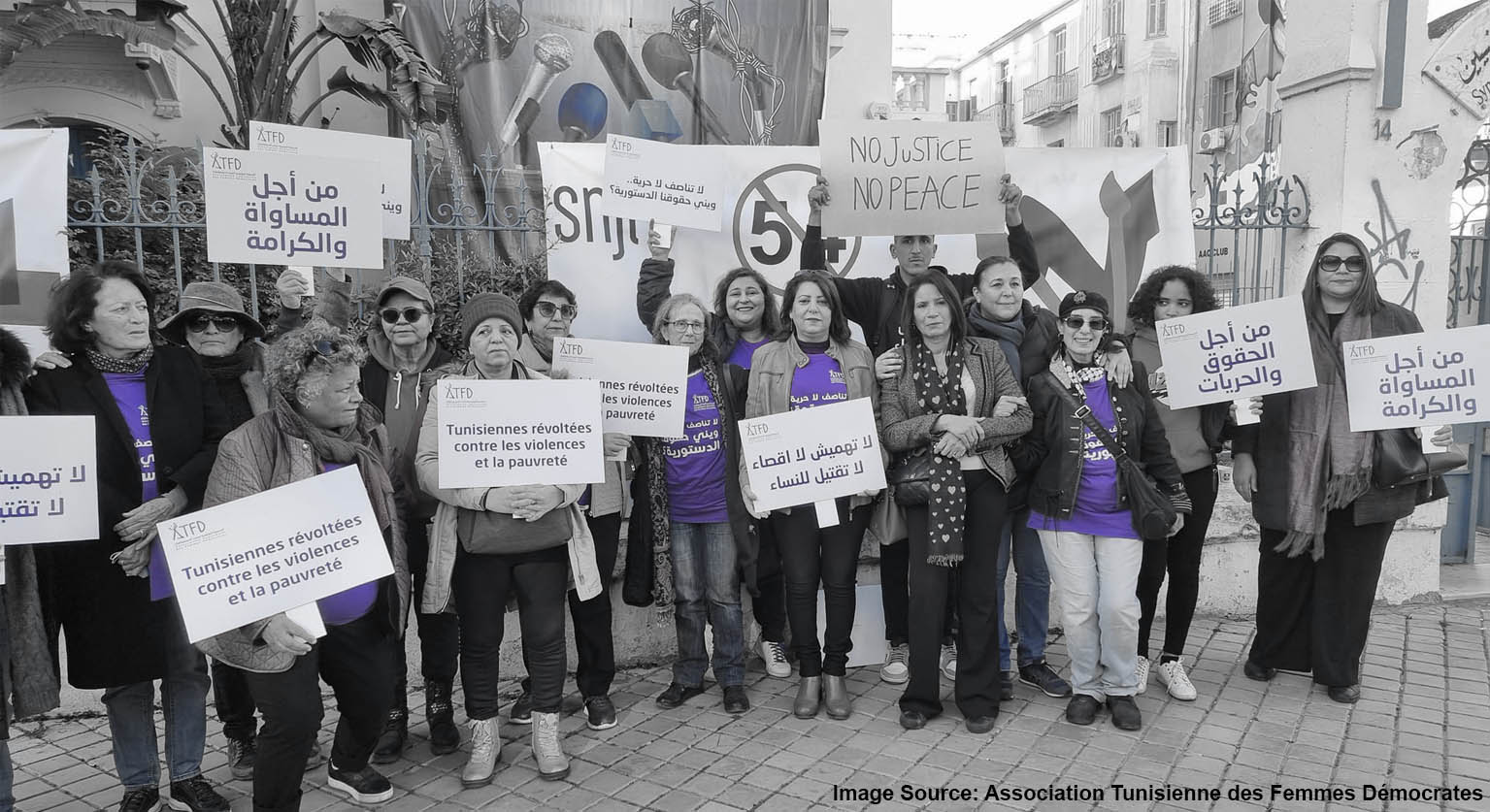

Women's Struggle and Political Rights – Fathia Hizem
Despite the extensive participation of Tunisian women in the 2010-2011 revolution, their situation did not improve during the democratic transition process. The implementation of reforms came to a halt since the coup on July 25, 2021, and the forcible seizure of power by the current president resulted in a regression in women's political rights.
Moreover, women's economic and social rights remain inactive. They suffer from high illiteracy and unemployment rates. Female unemployment rates were twice as high as men, even among highly educated women. Many women are employed in precarious jobs and are vulnerable to climatic conditions, exacerbating their impoverishment.
By marginalizing women, Gender inequality between women and men deepens the severe economic and social crisis in Tunisia. This deprives the country of the active participation of a significant portion of its workforce. Discrimination against women has tangible repercussions on the violence inflicted upon them, as it is both a consequence and a cause of such violence.
Political Rights of Women
The 2011 revolution enabled women to achieve significant steps forward, thanks to the emergence of numerous associations that enriched the public sphere, expressing the aspirations of women seeking to realize their citizenship.
Tunisian feminists are convinced that their human rights are interconnected and indivisible. Since January 2011, women have organized a national march that traversed the streets of the capital under the slogan "Equality between Women and Men." They refuse to be forgotten by history. Thus, the struggle began for an electoral law that imposed positive discrimination in favor of women. The task was not easy, but they emerged victorious, and an electoral law was adopted that enforced "parity and alternation."
The principle of gender equality was affirmed in Article 21 of the 2014 Constitution and parity in Article 46. The law allowed women in the first post-revolution parliament to occupy 31% of the seats, and they even held 48% of the seats during local elections, where party or coalition lists were required to respect horizontal parity in the leadership of the lists.
Women were at the forefront of the movements (2013) led by progressive and revolutionary forces to limit the power of the Ennahda Movement, which had gained power in the 2011 elections. They aimed to make their mark in formulating the constitution regarding democracy and women's rights. The fact that women's conditions did not experience stagnation indicates their constant desire to achieve full citizenship.
Women Confronting Populist Discourse
However, the conservative discourse constantly manipulates its message to appeal to the popular masses, including women. The discourse shifts from compassion to the use of religious arguments and claims of solidarity that never go beyond mere rhetoric when addressing the most vulnerable women. During the 2019 election campaign, the current president did not conceal his conservative vision regarding women's rights and the LGBTIQ+ Community. On August 13, 2020 (the anniversary of the issuance of the Tunisian Personal Status Code), he turned his back on all civil laws that govern the country, reminding us "that the Quran explicitly stipulates women's rights And a year later, on the same occasion in 2021, he provoked women through statements claiming to support the economic and social rights of working women without taking any concrete actions to prove it, despite the existence of laws that should have been activated (social security, retirement, and safe transportation for female farmworkers). He described feminists as "salon women" who do not matter to him.
This behavior aims only to marginalize the vibrant feminist movement, which has not ceased since the era of Ben Ali's dictatorship and has gained renewed strength after the revolution.
The president's populist discourse, along with his seemingly impromptu visits to the poorest neighborhoods, are nothing more than attempts to gain support amidst the multidimensional crisis that casts a heavy shadow on Tunisian citizens, pushing a quarter of the population into poverty (16.6% in urban areas compared to 40.4% in rural areas, according to the National Institute of Statistics).
In light of these exceptional circumstances, on July 25, 2021, several women's associations drafted a "feminist memorandum" that includes several of our demands, urging the state to address what we consider urgent to improve the situation of women.
This memorandum contains political, economic, and social recommendations, including access to healthcare for women, addressing gender-based violence, recommendations concerning the environment and access to water, as well as those concerning certain vulnerable groups (the "LGBTIQ" community and migrant women) to create a more equitable and inclusive society, where women can enjoy their full rights and contribute to the progress and development of Tunisia.
A Dangerous Setback
The decree issued on September 15, 2022, was a significant blow to women's rights in Tunisia, as never before in the country's modern history had women witnessed such a regression, which abolished the principle of positive discrimination.
A new parliamentary council was elected prematurely in early 2023, considering the previous council had been frozen and subsequently dissolved by presidential decree. The elections were conducted based on individual lists. We were aware of the possible setbacks regarding women's participation, so we proposed corrective measures such as adopting lists that include the necessity of having both a man and a woman. We were well aware that our country was still largely influenced by patriarchal thinking and that the "feminism of the state" emphasized by Bourguiba and became a symbol of Tunisia was insufficient to change the prevailing mindset in Tunisia.
Furthermore, such a law will likely revive tribal and patronage rivalries, all marginalizing women. However, the political authority did not heed our demands and maintained the principle of parity in the endorsement process, implying that women could only be used as fuel for war. Their presence in the nominations did not exceed 12%, while their representation in the parliamentary council remained at 16%. The new electoral law, which was adopted, explicitly or implicitly, eliminated public funding, effectively excluding women.
In this regard, we can assert that the new electoral law contradicts the Constitution. It could have been annulled if a constitutional court had existed. Unfortunately, the constitutional court stipulated in the 2014 constitution was not established, and its mention was omitted from the new constitution.
Another dangerous setback is embedded in the new constitution, which is found in its fifth chapter, shifting us from a civil state, as stipulated in the second chapter of the 2014 constitution, to a state based on Islamic law. The fifth chapter states: "Tunisia is part of the Islamic nation, and the state alone is responsible for working towards achieving the objectives of Islam in preserving life, honor, wealth, religion, and freedom." These vague words can be interpreted in various ways, and whenever religion is imposed on societies, it inevitably comes at the expense of women's rights and individual freedoms in particular.
Our struggle continues, whether through the Tunisian Association of the Democratic Women or in collaboration with other allied associations, for rights in general, especially women's rights, and for effectively establishing the rule of law and institutions.
We will persist in the struggle for democracy and freedom because we firmly believe that the feminist struggle is an integral part of the democratic struggle.
Our struggle continues for the people's right to a decent life and the protection of our country's resources for future generations.
Women's struggle persists on all fronts as long as capitalism and patriarchy collaborate to control women's bodies and minds.
Oh, women of the world, unite in the struggle against patriarchy and capitalism!
Recent publications

